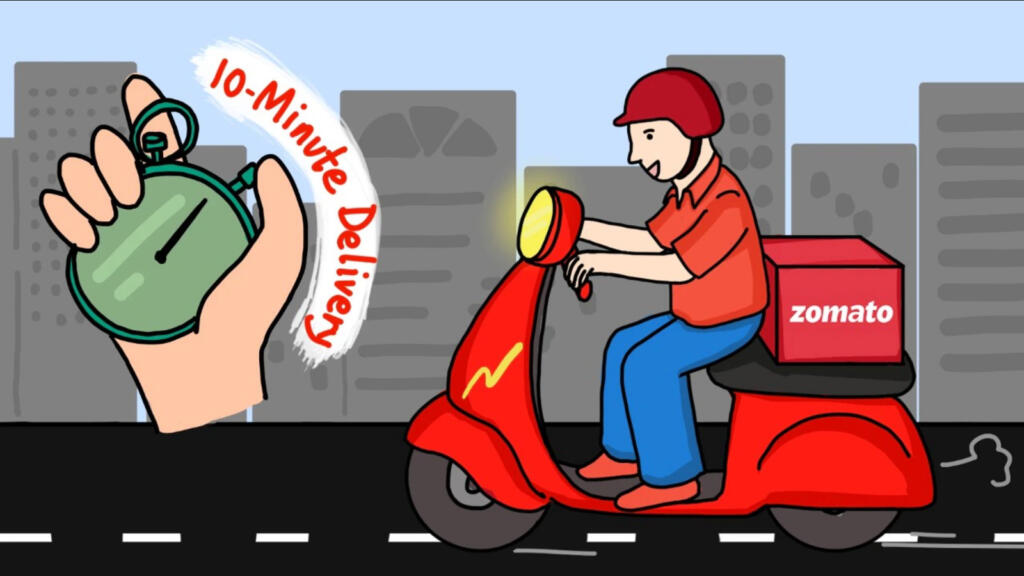- Zomato is reconsidering its plans to launch Zomato instant, a 10-minute delivery service all across India
- The company could not deliver to its customers as not many restaurants showed excitement for the initiative
- The 10-minute food delivery is a recipe for disaster, as there is very little credible evidence that it won’t harm stakeholders
Entrepreneurship and risk are two words that you will often find being used in tandem. If you are an entrepreneur and you are not able to take risks, then there is very little chance you’re going to succeed. But, more often than not, this risk-taking behaviour tends to take you down. Recently, Zomato also met the same faith as 10-minute delivery seems to have boomeranged on it.
Zomato’s initiative is failing
Zomato is re-evaluating its plan to launch 10-minute delivery services all across India. According to a report by Economic Times, Company has failed to fulfill its target of delivering food within 10 minutes of customers placing the order. Zomato had named its 10-minute delivery service as Zomato Instant and it was launched only in Gurgaon. Even in Gurgaon, it was run on a pilot basis, an experiment which would be replicated in further locations, if successful.
The person cited by aforementioned newspaper said, “Shortage of delivery fleet and intense heatwave in the North, which has also led to limited delivery workforce, are causing delivery delays of 15-20 minutes, unlike the 10-minute commitment offered by Zomato Instant.”
Experimentation did not provide desired result
Apparently, the pilot project in Gurgaon is limited as well. Only a few high-profile brands like Chaayos, Dana Choga and Caterspoint have signed up for this initiative. Now, the company is claiming that Zomato Instant was launched with an intention of consumer demand for quick-commerce and according to the spokespersons, the project has turned out to be a success in this regard.
The semi-failed business model forced Zomato to temporarily abandon its plans of launching Zomato Instant in Bengaluru. A Zomato spokesperson said, “The future course for the pilot is to deepen our penetration in Gurgaon before we scale this up to other cities and finetune a model that would work best for our restaurant and delivery partners.”
Read more: How an angry Zomato Customer’s spat with an executive snowballed into a “Hindi Imposition” war
Zomato under probe
Another reason for Zomato abandoning its Bengaluru plans was a recently launched probe by Competition Commission of India (CCI). National Restaurant Association of India (NRAI) had accused online food delivery platforms of various malpractices. These include charging unilaterally decided commissions from restaurants, not giving restaurants an option to use their own delivery partners and keeping restaurants in the dark about customer details. CCI later launched an investigation on various platforms, one of which included Zomato. The report is expected to come out in the next few weeks, only after which Zomato will decide on a future course of action.
Read more: Google feels the heat as Competition Commission of India sets its eyes on it
Controversial 10-minute food delivery model
On April 21, Zomato launched the controversial 10-minute delivery Zomato instant. It had promised to deliver fresh food within 10 minutes. Apparently, Zomato pitched this idea to stay relevant in the market.
Though Zomato was constantly expanding its services to newer cities, it was facing the possibility of being declared irrelevant in the wake of the advent of newcomers startups. Apps like Dunzo, Blinkit and Zepto were emerging as credible alternatives for Zomato and its ilks like Swiggy, Uber eats. Zepto is particularly making inroads with its 10-minute grocery delivery model. It even raised $200 million at the beginning of this month.
Read more: If you think Zomato IPO was bad, wait till you see Swiggy’s IPO
Company could not provide satisfactory answers to issues raised
It was becoming a survival issue for Zomato, so the company started its experiment in Gurgaon. Since, it was a new arena any food delivery company was venturing in, obvious questions about the safety of food as well as delivery partners were raised. To solve the food quality issue, the company announced that it was exploring a business model under which it would be buying a pre-decided quantity from restaurants, would store it in its houses and then deliver them to consumers when ordered.
It also said that the company has employed future-ready in station robotics and sophisticated dish-level demand prediction to keep the food fresh.
When quizzed about the safety of delivery partners in a hyper-competitive environment, Deepinder Goyal, Chief executive of Zomato did not give any logical explanation. In what seemed to be an arrogant denial of reality, Goyal said, “Ten-minute delivery is as safe for our delivery partners as 30-minute delivery,”.
Read more: Delivered in 10 minutes – Food or Death?
10-minute food delivery is a bad idea
The failing instant food delivery model tells us that there is a limit to which technology can change the realistic landscape. Food not just fills our bellies, but it also gives us energy to sustain ourselves in the long run. Serving food protected by technology is not sustainable in the long run until we want a weak population dependent on protein shakes and Vitamin tablets for nutrition.
Maybe, this is exactly what these companies want, a population who is happy with them for fulfilling their immediate needs, simultaneously dependent on their brethren for solving the problems caused due to them. This may be a need of the hour for them, this is bad for people and instant food delivery is a recipe for disaster.
